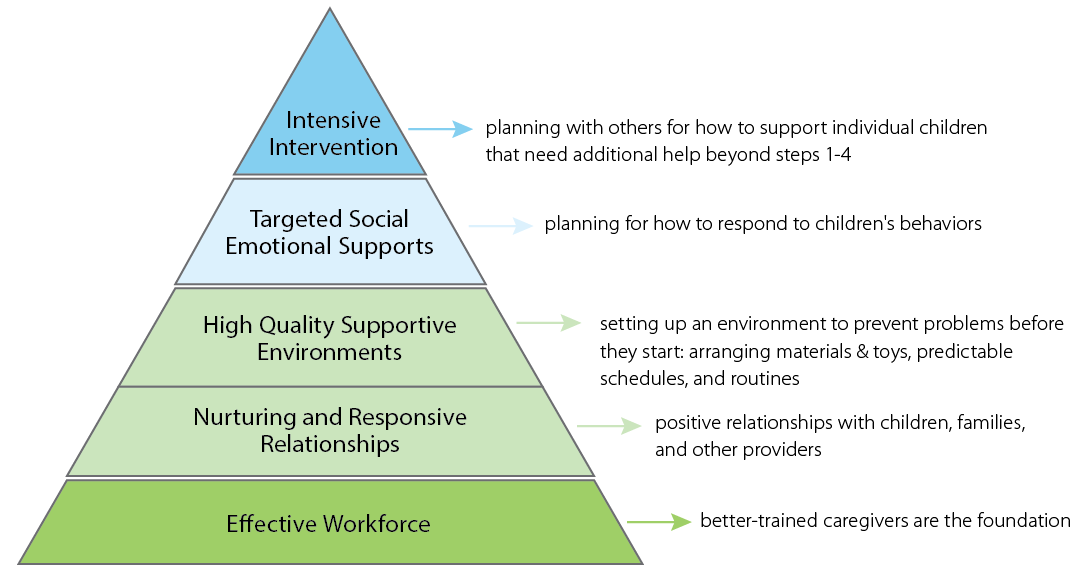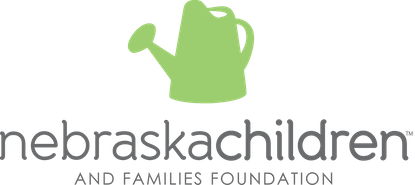Pyramid Model
The Pyramid Model for Supporting Social Emotional Competence in Infants and Young Children is a positive behavioral intervention and support framework early childhood educators and caregivers can use to promote young children’s social and emotional development and prevent and address challenging behavior. The Pyramid Model was developed to address evidence that 10-30% of all preschool students ages 3 to 5 are not behaviorally and emotionally ready to succeed in school; to address reports by preschool teachers that children’s disruptive behavior is the single greatest challenge they face; to address research indicating that 65% of students identified with social-emotional-behavioral issues in early childhood drop out of school, often leading to lifelong consequences including poor job outcomes, limited income and involvement with the criminal justice system; and to address data that shows preschool children are three times more likely to be expelled than children in K-12. The Pyramid Model organizes evidence-based practices for all children including those who need targeted social-emotional supports and individualized behavior support practices for children with significant social skill deficits or persistent challenging behavior.
Adapted from the Center on social Emotional Foundations of Early Learning (CSEFEL) and Implementing Positive Behavioral Intervention and Support: The Evidence-Base of the Pyramid Model for Supporting Social Emotional Competence in Infants and Young Children, Hemmeter, M.L., and Fox, L., 2014.

Research
Pyramid Model practices were identified through a systematic review of the research on classroom promotion, prevention, and intervention practices that have been associated with positive social-emotional outcomes and decreases in challenging behavior in young children with and without disabilities. This literature review was conducted by faculty associated with the Office of Head Start and Child Care Bureau funded Center on Social Emotional Foundations of Early Learning (CSEFEL). CSEFEL disseminates research and evidence-based practices to early childhood programs across the country.
Hemmeter, M.L., Fox, L., et al. (2014). A Classroom-Wide Model for Promoting Social Emotional Development & Addressing Challenging Behavior in Preschool Children, Pyramid Model Consortium.
Sugai, G., and Simonsen, B. (2012). Positive Behavioral Interventions and Supports: History, Defining Features, and Misconceptions. Center for PBIS and Center for Positive Behavioral Interventions and Supports.
Fox, L., Dunlap, G., Hemmeter, M.L., et al. (2004). The Teaching Pyramid: A Model for Supporting Social Competence and Preventing Challenging Behavior in Young Children. Young Children, July 2003.
Research Base of Pyramid Model Practices, Fox, L., and Hemmeter, M.L., (2014). Implementing Positive Behavioral Intervention and Support: The Evidence-Base of the Pyramid Model for Supporting Social Emotional Competence in Infants and Young Children, Pyramid Model Consortium.

Prevention Matrix
Primary, Secondary and Tertiary
Assessments and Measures Available
Benchmarks of Quality, Teaching Pyramid Observation Tool Revised (TPOT-R), The Pyramid Infant Toddler Observation Scale (TPITOS), Ages & Stages Questionnaire, Social-Emotional (ASQ-SE), Devereaux Early Childhood Assessment Clinical (DECA-C), Behavior Incident Recording System (BIRS), Teaching Strategies GOLD, Pyramid Model Teacher Survey.
Training
CSEFEL and the Technical Assistance Center for Social Emotional Intervention for Young Children (www.challengingbehavior.org ) have worked with 15 states to build capacity to implement the Pyramid Model within child care, Head Start, early intervention home visiting, public preschool, and early childhood special education programs.
State Partners include but are not limited to, California, Colorado, Hawaii, Iowa, Maryland, Massachusetts, Nebraska, North Carolina, Tennessee, Vermont, and Wisconsin. In Nebraska, a state Pyramid team collaborates regarding funding, training, technical assistance and evaluation.
In 2013-2014, the Nebraska Department of Education (NDE) launched implementation of the Pyramid in ten early childhood programs in nine school districts. A total of 56 classrooms with over 1,000 children are participating. In June 2015, NDE will sponsor a Training Academy for district-wide implementation in school district preschool programs.
In 2014 Rooted in Relationships launched implementation of the Pyramid in child care settings in three NE communities utilizing the coach, train, coach model. Seven child care centers (15 classrooms) and 10 home based providers are participating in the two year project with 288 children being directly served. CSEFEL materials are being adapted to reflect child care settings and their unique needs.
Training materials, videos, and print resources are also available directly from the CSEFEL website to help early care, health and education providers implement the model:
• Infant/Toddler
• Preschool
• Pre-K Parent Modules
• Infant/Toddler Parent Modules (PIWI)
State partners
Nebraska Department of Education
Nebraska Department of Health and Human Services
Nebraska Children and Families Foundation
Nebraska Head Start-State Collaboration Office
University of Nebraska Medical Center-Munroe-Meyer Institute
University of Nebraska-Lincoln Extension
Nebraska Children Grantee Communities
Rooted in Relationships, Nebraska Children's early childhood mental health initiative, has granted funds and is training communities on the pyramid model in:
- Dakota County
- Dawson County
- Dodge County
- Hall County
- Lancaster County
- Saline County

